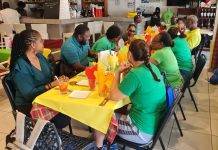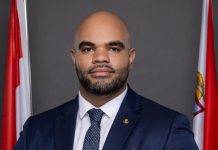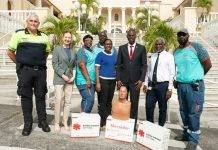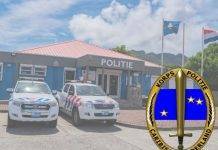PHILIPSBURG, Sint Maarten — The violation of human rights in prison must stop, attorney Sjamira Roseburg said on behalf of the Inmates Association the Pointe Blanche. Prisoners are on strike for the seventh day in a row, and announced through their lawyer that they will continue their action as long as there is no dialogue and a timeline for structural progress.
“We have been led to believe things will improve for far too long,” the inmates association stated. “The response from management is noted, but this is again to put a plaster on the wound. This cannot go on like this any longer. It’s time for action!
With eighty men and seven women incarcerated, the Pointe Blanche prison is overcrowded. Prisoners say they are “all hurdled up”, and that their safety and health are at stake.
“The pressure within the prison has to be relieved,” said attorney Roseburg, “Resources are scarce, we know that, but we cannot continue to treat inmates like this.”
The attorney refers to relevant legislation. “Under Article 7 of the National Ordinance Prison Order (Gevangenismaatregel) 1999, one or more doctors and dentists must be affiliated with the prison. Article 8 of this National Ordinance stipulates that the detainee shall be examined by a prison doctor as soon as possible, but in any event within 24 hours after admission to prison.”
It is essential for the safety of prisoners that they are tested for HIV, leprosy, syphilis and tuberculosis. This all is not happening, according to the Inmates Association.
The prisoners who were transferred from the heavily damaged Pointe Blanche prison to the Netherlands after Hurricane Irma in 2017 were medically tested there in accordance with the detention protocol. The detainees who were transferred from St. Maarten to Curacao were also tested for HIV and other infectious diseases after arriving at Sentro di Dentenshon i Korekshon Korsou in Koraal Specht, where HIV-positive prisoners are placed together in a cell and risky contact with other prisoners is avoided. “Why aren’t we following the same regulations as on the other islands in the Kingdom?”, attorney Roseburg asked.
After her visit to the Pointe Blanche on Tuesday, Roseburg said that the stress is high among prisoners. “The prison is full. While a maximum of seventy men were previously admitted, eighty men are currently detained. How is this even possible?”
The prison cells are shared by two prisoners. They have no privacy, many fear for their safety, are afraid of becoming infected with HIV or contracting another infection, are concerned about the lack of medical and dental care, nutrient-deficient meals, and would like more visits and contact with their family.
Opportunity to call family is very limited, public telephones are up to now not in place. This is an issue for the longest of while now, Roseburg said. According to the attorney this is a missed opportunity for a better environment at the facility. This needs to be tackled sooner than later, she said. “When the public telephones are reintroduced, and detainees can have structural contact with family members, this will reduce stress. Also for children, partners and parents of prisoners. Everyone benefits from more contact.”
For consideration by prison management, the attorney is proposing the establishment of an intimate family room in the prison. This will relief stress, she said. “Children and other family in the first degree should be able to maintain close relationships with their imprisoned family member and/or partner.”
Roseburg is of the opinion that scheduled weekly supervised visitation is not sufficient. “It is important that detainees can have quality time with close family members at different times,” she concluded.
There is currently too much tension among inmates, and between inmates and prison guards, the attorney said. “The pressure has to be alleviated. Two days ago there was a fight where inmates needed to assist the guards. It’s time for actions, because if things go wrong, they will go very wrong.”
Also by increasing the outdoor recreation time the stress among the inmates and prison guards can be reduced. At this moment the inmates only have one hour outside in the morning and one hour in the afternoon. This is the minimal number of hours based on the law.
By having inmates also work outside the prison, stress will be reduced, Roseburg said. “On the other hand, this will also further contribute to the economy of the country of St. Maarten. So in my opinion a win-win situation. While the legislation offers this possibility, not enough use is made of this.” The attorney indicated that the pressure can be furthermore reduced by making structural use of electronic supervision again. Because the prison is full of long-term prisoners, cell space is sporadically released and there is little circulation. “Space has to be freed up, you cannot secure a prison at full capacity with only two to three prison guards,” per shift Roseburg said.
An increase in the number of people serving very long sentences also means that some convicts are held in police cells, which is not legally justified.
The police cell complex behind the police station in Philipsburg, an annex to the Pointe Blanche prison, is exclusively intended for suspects, who according to the law may not be held there for longer than ten days. These legal requirements are regularly ignored by authorities because there is no space, attorney Roseburg said.
Currently, detainees are entitled to Conditional Release (VI). VI means that a convicted person can be released under certain conditions after serving 2/3 of the prison sentence. However, more needs to be done in the short term. Therefore, I am requesting on behalf of the inmates to reintroduce rewarding of exemplary prisoners. “We don’t have to reinvent the wheel,” Roseburg said. “We can once again use the policy from the past, in which additional options were used in addition to Conditional Release (VI). After all, punishment alone is counterproductive. Detainees who behave well in prison, who do work, who set an example for others, deserve to be rewarded for that.” The attorney pointed out that, as was done in the past, the Governor of St. Maarten can grant exemplary prisoners a ten percent reduction on top of the VI of the sentence imposed by pardon. The Governor can also grant a penalty of up to four months for non-compulsory work.
Inmates who voluntarily perform maintenance work in the prison, or otherwise make a positive contribution, should be able to count on a reduced sentence, attorney Roseburg said.
If a foreigner is convicted of a criminal offense and is detained in Pointe Blanche prison, after several months of detention, depending on the type of case the Governor of St. Maarten could also grant a pardon. This means that the prisoner will be sent to his country of origin, on the condition that he does not return to St. Maarten. If the person concerned ignores this order and comes to St. Maarten within the next ten years, he will be arrested and obliged to serve the remainder of his prison sentence, after which he will be deported.
Roseburg: “All the above mentioned requires a proactive approach from the Ministry of Justice, the Prosecutor and the Governor of St. Maarten. Action must be taken!”






























